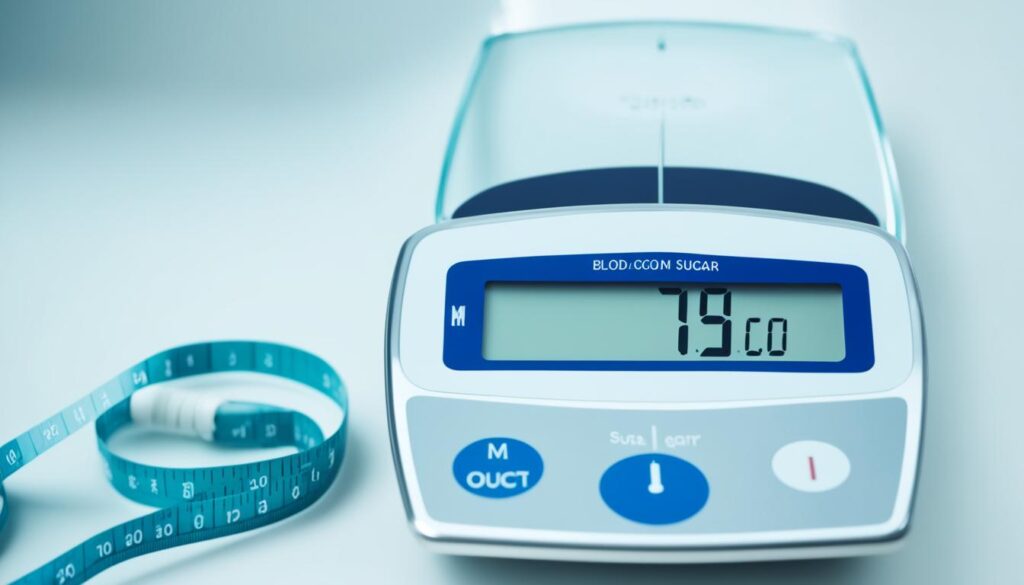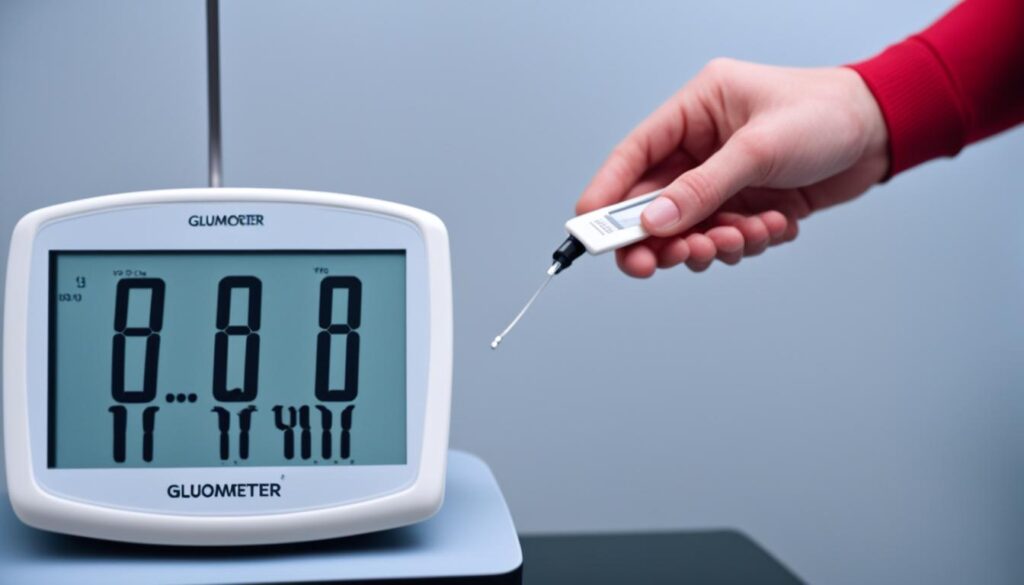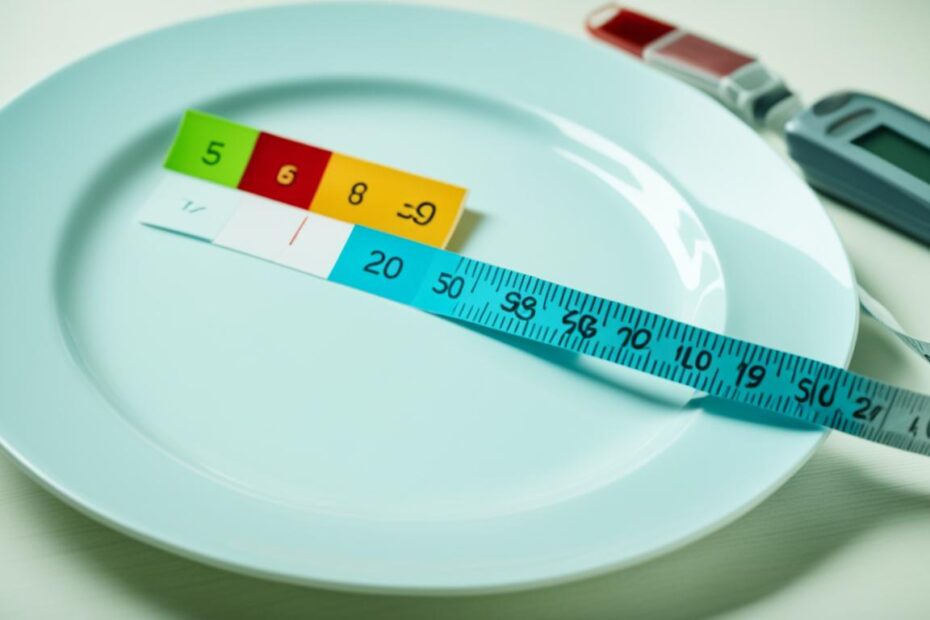Can losing weight affect blood sugar levels? It’s key for managing diabetes and staying healthy. I wonder how losing weight could change my blood sugar levels.
Being obese is closely connected to blood sugar. Losing weight can really help control it. Some research says losing a lot of weight might even stop diabetes in its tracks. This made me eager to learn more about how weight loss and blood sugar are linked.
Understanding the Link Between Weight and Blood Sugar
Weight and blood sugar levels interact closely. We’ll see how they influence each other. This connection is vital for our health.
The Role of Insulin in Blood Sugar Regulation
Insulin plays a vital role in controlling blood sugar. It lets sugar move into our cells. This lowers sugar levels in our blood. But, if our bodies don’t use insulin well, we face problems like insulin resistance. This is a big part of prediabetes and type 2 diabetes.
How Excess Weight Affects Insulin Sensitivity
If we have too much weight, our cells might not react to insulin well. This means more sugar in our blood. And it makes getting diabetes more likely. Research shows losing weight can help. It makes insulin work better and might even reverse diabetes.

The Impact of Abdominal Fat on Diabetes Risk
Belly fat is a particular problem. It can damage the pancreas. That’s where insulin is made. Keeping your waist size in check is important. For most men, a healthy waist is under 94cm (37in). For women, it’s under 80cm (31.5in).
When you lose just 5% of your body weight, it helps if you have type 2 diabetes. For more benefits, try to lose 15kg (33lbs). A mix of healthy eating and regular exercise works best. This is key in fighting prediabetes too.
Does Weight Loss Lower Blood Sugar?

Yes, losing weight can really help control your blood sugar. Even a small weight drop makes a big difference. People with type 2 diabetes see better blood sugar at just 2% less weight.
Losing 5% extra weight does even more. It lowers heart disease risk by helping your blood pressure and cholesterol. For many, this is about letting go of 10 to 15 pounds. The results are improved health, more energy, and lower blood sugar.
For bigger changes, try losing 10% to 15% of your weight. You’ll see a big difference in how you look and feel. Eating right and managing blood sugar is very important. Focus on carbs that are high in fiber, like veggies and whole grains.
Don’t forget, exercise is key too. Try to do 2½ hours of moderate activity every week. Adding in some strength training is great as well. This pair will help you lose weight and keep your blood sugar in check. Plus, you might need less medicine as you get healthier. But always talk to your doctor about any changes.
The bottom line is this: losing weight can help lower your blood sugar. By changing your diet and how you move every day, you can improve your health a lot. This is great news for managing diabetes.
The Benefits of Weight Loss for Diabetes Management
Losing weight is key for preventing and managing type 2 diabetes. Dropping extra pounds helps a lot. It improves blood sugar and health for those with diabetes.
Improved Insulin Sensitivity
Weight loss makes our bodies react better to insulin. This helps us control blood sugar better. Losing just a little weight, like 5-10%, is a big deal for managing diabetes.
Reduced Medication Requirements
When insulin sensitivity goes up, we might need less diabetes medicine. Some might need smaller insulin or pill doses. A few could even stop some medicines, with their doctor’s okay.
Potential for Diabetes Remission
Research is finding that big weight loss might stop diabetes in some cases. This is more likely for those who lose weight soon after being diagnosed. Not everyone will get better completely, but there’s a chance.
Adding weight loss to a diabetes plan improves our health. Even small efforts count a lot. They help a ton in getting your blood sugar under control.
Effective Weight Loss Strategies for Blood Sugar Control
Keeping a healthy weight is very important for your blood sugar. A good diet is key. Focus on eating less and choosing healthy foods. Doing this can really help with diabetes.
Eating only 800 to 1200 calories a day works well. The DiRECT study proved this with its 850-calorie plan. This method can help you lose a lot of weight and control blood sugar better.
Don’t forget to exercise. Moving more helps you burn calories and get stronger. I suggest doing both cardio and strength exercises. Even small steps can improve your health a lot.
Always talk to your doctor before starting any new diet or exercise. This is super important if you take insulin or some diabetes drugs. They will make a plan that’s just right for you.
- Choose nutrient-dense, low-calorie foods
- Incorporate regular physical activity
- Monitor your progress and adjust as needed
- Work closely with your healthcare provider
Using all these tips together helps you manage blood sugar better. Keep at it and be consistent. This is how you make real, lasting changes.
The Science Behind Weight Loss and Glycemic Control
I found out some interesting stuff about weight loss and blood sugar. Did you know heavy people might need a lot more insulin? This is important for fighting weight issues and diabetes.
Metabolic Changes During Weight Loss
Losing weight makes our bodies change a lot. Scientists found that dropping 5-10% of your weight can lower diabetes risk. It’s a big deal for keeping your body healthy.
- Insulin sensitivity improves
- Blood sugar levels may normalize
- Pancreatic function gets better
The Role of Fat Distribution in Blood Sugar Regulation
Where our fat is places matters. Belly fat can hurt the pancreas. That’s why waist size is important for health. Men should have less than 40 inches and women less than 35 inches.
Staying at a healthy weight helps you avoid type 2 diabetes, even if it runs in your family. It shows how much control we have over our health through weight.
Sustainable Weight Management for Long-Term Blood Sugar Benefits
Staying a healthy weight helps keep blood sugar in control. It’s not just about quick weight loss. Making lasting changes is what matters. Here are some proven steps to do just that.
Balanced Nutrition for Diabetes Management
Eating well is vital for those with diabetes. I pick foods that keep blood sugar stable. Watching carbs and portion size are big parts of this. Eating a mix of foods keeps me energetic and my blood sugar level.
Incorporating Regular Physical Activity
Moving around is a huge plus for managing diabetes. I aim to be active daily. Yet, even a short stroll can help. It’s wise to ask your doctor which activities suit you best. Being active helps me shed weight and manage blood sugar better.
Monitoring Progress and Adjusting Goals
Tracking my progress keeps me in the right direction. Checking blood sugar and weight weekly is common for me. I also keep an eye on my waist size. Doing this tells me if my plan is working or if I need to pivot. Doctor visits also help ensure I’m making smart health choices.
